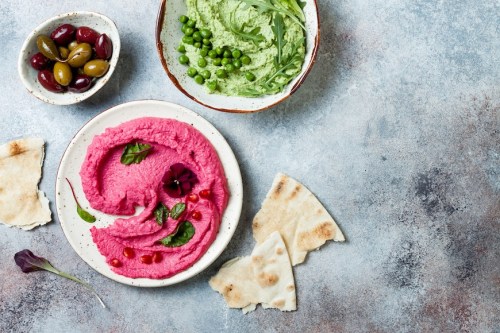Our editors independently select these products. Making a purchase through our links may earn Well+Good a commission
These are the healthiest hummus varieties that go way beyond chickpea
Registered dietitian Tracy Lockwood Beckerman compares the healthiest hummus varieties, including edamame and red lentil, savory and sweet.

Just like that one friend who always insists on getting to the party early, hummus was in the fridge long before healthy eating was a whole scene. (And also at the party, next to the crudités platter, readily scooped up by everyone who doesn’t like ranch dressing.) But chickpea hummus isn’t the only option you’ll find in the refrigerated section at your local grocery store.
Like the pasta, hummus has embraced a variety of ingredients. There’s hummus made out of black beans, white beans, lentils, edamame, beets. How’s a healthy eater to know which one to go for? Are brands just using clever marketing to stump us? Answering the questions in Well+Good’s Cook With Us Facebook group is registered dietitian and The Better Period Food Solution author Tracy Lockwood Beckerman, RD.
How to choose the healthiest hummus made with a variety of ingredients
Best for fiber: black bean hummus
Both chickpea hummus and black bean hummus are good sources of protein, but Beckerman says the black beans win with fiber content. “Black beans have a slightly higher fiber amount than chickpeas—15 grams verus 12.5 grams in 1 cup—and black beans have 20 calories less than chickpeas,” she says. While more fiber is definitely a positive, Beckerman says chickpea hummus is slightly higher in iron, although both have almost two times as much iron as a three ounce serving of steak.
best for protein: edamame
“Edamame takes the cake because it’s a complete protein, which means it has all nine of the essential amino acids,” Beckerman says. She says she loves that edamame is high in protein and fiber while being low in saturated fats. But there are still some factors to look for when reading the label. “Edamame is usually a genetically modified food, so if you are against eating these, then you need to make sure the label says ‘non-GMO,'” says Beckerman.
best for cardiovascular health: beet hummus
Beets contain nitrates, which could positively impact blood flow in the body and mitigate high blood pressure, says Beckerman. “This could help reduce menstrual cramps and even migraines,” she says. Beckerman says if you have kidney disease, this is one hummus variety to steer clear of because it’s a high-potassium food. (An otherwise good thing for the average individual.)
best for your immune system: red lentil hummus
Food can be your best weapon for not catching the nasty bugs flying around the office this time of year, and Beckerman says red lentil hummus is one to add to your immunity-boosting shopping list. “Lentils are high in folate and selenium which are both great for energy production and for major immune protection,” she says. Beckerman also adds that they have more fiber, iron, and potassium than chickpeas, and less carbs.
best for a healthy treat: dessert hummus
Chickpeas are still the main ingredient, but there are also other ingredients, like dark chocolate, too. Beckerman’s verdict: She’s into it for a healthy sweet treat. “The fiber content is lower than traditional hummus and there’s more saturated fat–typically from coconut oil—and sugar, but overall, this dessert option is healthier than [many others] and you’ll get some vitamins to boot!” she says.
Variety is a big part of healthy eating; it not only keeps you from getting bored but it ensures you’re getting a wider range of nutrients, too. That means the fact that the hummus section has gotten more crowded is definitely a good thing, whether you’re picking up a tub for an app or dessert.
Find out why chickpeas are a staple of the Mediterranean diet:
So that’s the low-down on how different types of hummus compare. Here’s how to choose the best non-dairy milk for you. Plus, join Well+Good’s Cook With Us Facebook group for more healthy food intel.
Sign Up for Our Daily Newsletter
Get all the latest in wellness, trends, food, fitness, beauty, and more delivered right to your inbox.
Got it, you've been added to our email list.










